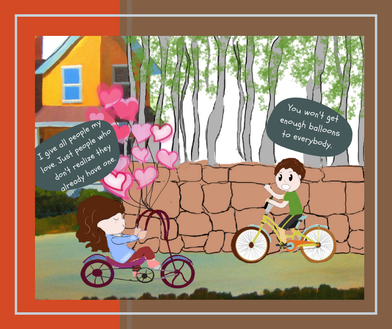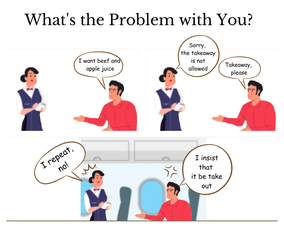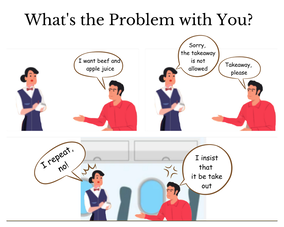Women Wellness Spring |
|
What does a giver want to focus on others that provoke conflicts? How to release the communication tension? By using an enneagram as a tool, observing the finding from my experience with the real stories, that help me to come up with the insights that work for me to build great relationships with others. The Giver (Enneagram / #2. The Giver) The Character Susan loves to do a lot of sweet things. She is good at making other people feel warm and cozy such as writing a touching note on the cupcake wrapper for her friends. Jenny remembers the birthday of her parents, friends, relatives, and even her neighbor. She would bake cookies and buy wonderful birthday presents to celebrate. Amy cooks more than enough food for the family as she will take the food for the homeless guys and the underprivileged children. They want to take care of the well-being of everybody around them, give their love to express their feelings, help others, and desire for others to respond to them in return. World view and drive They want to be needed The drive is love. They want others to like them, always advocating for love. No doubt they have big hearts decent in the human spirit. From their perspective, there is no reason to reject their love. They tell themselves: I love you so much that you should regard me as the important person in your world. You will cut them deeply if you don’t respond to their love. Expressing great love sounds pretty. Everyone would like someone to care for them with warmth and love. With no surprise, they can easily make friends with others and attract people to love and like them. Communication Tension As they want to be needed, they tend to focus on the insufficiency of others. They almost always regard themselves as rescuers to take over the responsibilities of others without asking permission, for the feeling of being superior to be needed. The Story One day, Susan goes shopping and buys plenty of dresses and pants for the family. When Mandy (her daughter) returns home, she shows the dress that she buys for her. Mandy: OMG! The dress looks awful. You don’t know fashion. I like to buy the clothing by myself. Susan: I saw you wearing the same dress every day, never go shopping to buy new clothing. What I buy for you is the work of a well-known designer and is costly. You are being so rude! OK, throw it away. She burst into tears. That dress isn't bad. Mandy doesn't mean to hurt her mom. She just doesn't like the outfit. No doubt the givers are kind and generous to care for others. At the same time, they are unaware they are playing the role of God, something like a mother loves her children at the expense of controlling them in every aspect of their life. They tend to believe that no one will know how to love you better than they do. How to communicate with the giver with a healthy boundary? If you are a giver, what is your particular lesson to learn? Stay tuned to the upcoming article for part 2 about the giver. This month series is about Communication. Start the journey in here.
0 Comments
What does a perfectionist want to focus on others that provoke conflicts? How to release the communication tension? By using an enneagram as a tool, observing the finding from my experience with the real stories, that help me to come up with the insights that work for me to build great relationships with others. How about if your coworker or your parents are perfectionists with who you can’t avoid interacting? You can’t walk away every time where there is conflict. With family, you cannot always run from the issue. How to get along with perfectionists?1. Don’t take it personallyYes, you feel hurt and gravitate towards backtalk immediately. Pause from the verbal stimulus and try to understand they are highly disciplined people carrying good intentions to fix the wrongs through improvement. They won't accept different ideas other than their beliefs and demand others to fit in their ideal rules. A heated argument only fuels the anger of both sides and worsens the situation. How to respond? Tell them: Thank you for your sharing. It may sound sarcastic, and at least the conversation is over. 2. Don’t Play VictimBack to the story, my immediate narrative of her abrasive manner was to play the victim. I felt like I was the victim to bear her workload during her long absence led me to get insufficient time to do my jobs well. She indeed should give thanks to me instead of picking any minor mistakes for blaming me. When I thought I was a victim, I would naturally try to find a persecutor. And then, I realized what was the point to give up my power. What she thought and said was her choice. How to respond to her behavior was my choice. It is your story, not my story. 3. Use Yes-No-Yes communication.Recap the story: Jen was my co-worker who took maternity leave for more than three months. One day, she found I had misplaced some files causing trouble for her. She used an abrasive manner yelling at me to address what I was not doing right as if I was an idiot. Jen: Do you miss out save all the (digital) files in the folder? Me: I did save all the files. Jen: No, you should save files A, B, C, and D. You miss out save file A. Me: I had saved files B, C, and D. File A was redundant. What is the meaning of saving two same files together? Jen: Starting from the first day of work, my boss told me I should save all A, B, C, and D files. She amplified the issue by raising her voice and yelling at me. Me: What's wrong with you? I can’t understand what is the big deal about this issue? Jen: You think this issue has no problem, that issue has no problem, nothing has a problem. Both she and I were angry. We never talked with each other over the whole day. Yes-No-Yes Communication (Yes) I know the workflow is from the company for everyone to follow that keep going for years. Breaking the norm may arise unforeseen problem to others. (No) Frankly speaking, finger pointing make me uncomfortable. I simply think it doesn’t make sense to make simple work complicated. I’m busy in the middle of completing my urgent work right now. Let’s discuss tomorrow to go through the current workflow in order to find out solution. (Speak nicely, don’t judge, make other person feels comfortable so that she will accept your point easier.) (Yes) I will prepare more information for discussion. Let’s talk tomorrow. (Suggestion and promise) If you are a perfectionist,adrenaline stumbles up and down and won’t make you feel good.
Ever heard people say that: Your feeling becomes your thinking. Your thinking becomes your words. Your words become your action. Your actions become your result. And this will become your destiny. Once you change your perspective, you will change your feeling, thinking, and words. Change the perspective: Forgiveness vs. correctness 1. Learn to forgive Forgive the world is imperfect. Forgive people are imperfect. Forgive you are imperfect. Forgive you can be all wrong. Everyone would make mistakes. You and I would also make mistakes. The ones who made a bad decision might because they want to cut corner. It might because they do such things out of convenience. Or it might simply because they are stupid. They would learn the lesson and become smarter next time 2. I could be all wrong Don’t create the drama triangle as a persecutor. The communication conflict between two persons is about each of them regarding the other person is wrong. It is about our certainty of rightness that makes heated arguments heated. How unlikely you’re always right, and I’m always wrong. When people tell you something’s wrong or doesn’t work for them, they are almost always right; And when they tell you exactly what they think is wrong and how to fix it, they are almost always wrong. If the methods you’ve used to judge other people, to make decisions have been helping you get exactly what you seek, congratulations. In fact, how unlikely you know all the answers. Respect there’s a chance the other people to work on their filers, their habits and their instincts. A rock climber doesn’t see a steep slope the same way an elderly person does. In fact, there are many things where right or wrong are relative, perhaps merely based on perspective. When you encounter a situation that triggers your anger, try to calm down your emotions to tell yourself: I could be all wrong. And after you convey your points, and ask: what do you think? What does a perfectionist want to focus on others that provoke conflicts? How to release the communication tension?
By using an enneagram as a tool, observing the finding from my experience with the real stories, that help me to come up with the insights that work for me to build great relationships with others. The Character My mom keeps the house perfectly clean without any dust on the furniture. Everything organizes so well that she regards it a big deal if anyone tries to misplace the stuff, not in the exact original position. She keeps focusing on pinpointing anything imperfect that drives me crazy. Susan can't tolerate making grammatical mistakes and used to pick grammatical errors whenever she reads articles or emails. Mandy feels angry with her coworkers when they fail to follow all the steps accurately. If the rule is ten steps, you should not make it more than or less than ten steps. Worldview and Drive What do they want? They want to be correct. The drive is anger. They believe the world operates as an ideal framework of standards or rules upon people to follow. They want to fix the wrong and improve everything consistent with their ideals. They want to justify themselves, to be beyond criticism so as not to be condemned by anyone. People may describe them as stubborn and picky. A simple issue will trigger a heated argument, and they will never back off. Subjective vs. Objective While they appear stubborn, picky, and subjective on the surface, they are much more objective than you think. They did not set up the standards and rules by themselves. Objectively, they have learned the rules from outside (authority, parents or schools) about all those standards. They’re picky with consistent standards and rarely change their preferences frequently in response to who is presenting to them or when their mood changes. Communication Tension They are perfectionists and focus on the imperfect aspect of others. I am right, and you are wrong. Anger drives them to complain, critique, and judge. My mom would be mad at me merely because I had not put the spoon back in the drawer after dinner. A heated argument came after as she insisted on her point about correctness and blamed me as if I couldn't do anything right. However, it is how unlikely everyone would see the world the same way. Perfectionists feel angry when they can’t get others to do what they consider correct. And then, they push harder, throw out tantrums, and even shout. Studies by research that 55 percent of communication is conveyed through facial expressions, gestures and posture, 38 percent is conveyed through tone and only 7 percent comes through words. In other words, it is not about what you said but about how you say it. The finger-pointing attitude causes the other side responds with even more resistance, triggering the defensive mode and shutting you out. At the moment of the heated argument, both sides are sure the other person is the wrong one. If you are a perfectionist, some of your friends have concluded it is not just worth disagreeing with you, and others have concluded it’s not even worth talking to you, since people never know when a topic will lead to a controversy. How about if your coworker or your parents are perfectionists with who you can’t avoid interacting? You can’t walk away every time where there is conflict. With family, you cannot always run from the issue. The Story Jen was my co-worker who took maternity leave for more than three months. One day, she found I had misplaced some files causing trouble for her. She used an abrasive manner yelling at me to address what I was not doing right as if I was an idiot. Jen: Do you miss out save all the (digital) files in the computer folder? Me: I did save all the files. Jen: No, you should save files A, B, C, and D. You miss out save file A. Me: I had saved files B, C, and D. File A was redundant. What is the meaning of saving two same files together? Jen: Starting from the first day of work, my boss told me I should save all A, B, C, and D files. She amplified the issue by raising her voice and yelling at me. Me: What's wrong with you? I can’t understand what is the big deal about this issue? Jen: You think this issue has no problem, that issue has no problem, nothing has a problem. Both she and I were angry. We never talked with each other over the whole day. How to deal with Jen (a perfectionist)? If you are a perfectionist, what is the particular lesson that helps you to leap for a better life? Stay tuned to the Perfectionist Part. 2 There will be stimuli from the other’s words and behavior that make you angry, sad, or resentful. Someone is offensive, finger-pointing, and harassing you. You may think: What’s wrong with you?
Controllable vs. Uncontrollable Your thinking in your mind is controllable. The thinking in the mind of the other person is uncontrollable. The tragedy is when you happen to do the reverse. The reverse is when you are trying to control the uncontrollable thing (change the other people thinking); and not willing to change for what you can control (your thinking). Relationship with others Never be serious about the abrasive manner of others because you never know: About their perspective to interpret what happens; About their psychological projection; About their moods. All the above are none of your business. Give back other people's responsibility for themselves for handling their problems. Ever heard a proverb: There are only three businesses in life. My business (well, yes, we can control our business) Your business (we cannot control other people’s business) God's business (God has a plan for us, we can only obey and accept, of course.) Therefore, Focus on your own business. Focus on what matters. Do your thing. Don’t waste your energy trying to change opinions. Remember that you are not the other people’s opinion. Feel good about yourself through self-affirmation (check with Louise Hay's you-tube channels) as a firewall against an adversary. Handle adversary with empathy and respect. Don’t judge, condemn or criticize. Avoid creating the drama triangle. Do not drag yourself into the drama triangle of others as well. And then, you get the inner tranquility, peace and calm to get along with others. That is easier said than done. This work for me. I hope this can work for you. Relationship with yourself The most important relationship is the one you have with yourself. You are the only person who can tell whether you are happy at this moment, right now. In case of your current pattern drives you to where you seek to go, congratulation. Or does your current pattern create emotional grief with the discrepancy between what people see of you on the outside and what you are experiencing on the inside? If so, you are unaware that you are the problem. The problem is that you have a particular lesson to learn, and you haven’t learned yet. Once you change your perspective, you will change your feeling, thinking, and words. How to completely change the repeated pattern from living the life you truly desire? How to identify your particular life lesson to leap for better life? Stay Tune to the next part of the series What causes better or worse relationships with others?
The greatest secret to a great relationship is communication. Ever heard the easiest thing to do is to criticize others? And the hardest thing to do is to understand yourself. What is your worldview? What do you want to focus on others that provoke conflicts? What is your drive for acting the way you do? What is the one particular lesson you shall learn to reverse the repeated tendency? I invite you to join my journey to transform my relationship with others via creative ways to level up communication. This Month's Series Is About Communication. Stay tuned to the next post about the Killer strategies that help me to deal with difficult people. |
CatherineDigital marketer, writer, editor, feminine optimistic style, pursuit of happiness, addict to coffee. CategoriesArchives
May 2024
|
|
Privacy Policy
|
Disclaimer
The information contained in this website is for general information purposes only. We make no representations or warranties of any kind, express or implied, about the completeness, accuracy, reliability, suitability or availability with respect to the website or the information, products, services, or related graphics contained on the website for any purpose. Any reliance you place on such information is therefore strictly at your own risk.






 RSS Feed
RSS Feed